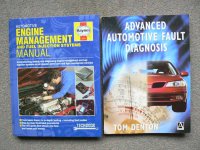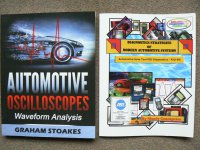I stopped earning my living "on the tools" in the 1980s. However that's not to say I haven't been very actively involved with maintaining and repairing cars, lawnmowers and other mechanical stuff (vacuum cleaners being a particular "speciality") - mostly belonging to family members, right up to this present day. Being now a "driveway grease monkey" and working very much on my own, I find I just love reading on our forum about what other people have been doing and where they get their info. So I just thought the following might be of interest?
I was always very much a "spanner and big hammer" mechanic when in the workshop. Electronics and Diagnostics were always a bit of a dark art. This wasn't a problem because there was always someone in the workshop who would be knowledgeable about these aspects of the cars I could turn to. Even after I moved on into more supervisory and instructional rolls there was still always someone else I could call on. Then, at 50 years of age I took a completely different career path and quickly lost easy access to these technicians. Still obsessed with all things mechanical I was finding it increasingly frustrating not to be able to deal with the engine management "stuff" and general electronic systems (ABS etc). I had access to a friends scanner but didn't really know what I was doing with it - apart from service reminder resets etc. So I started "bothering" the folks in my local garages. I was very pleasantly surprised to find a couple who were very helpful and encouraged me. The lads at AVW deserve particular thanks. They are an independent VAG workshop and they advised me to buy VAG-COM (as it was in those days - now called VCDS. Google it at Gendan if you're interested) So I splashed out about £250 and the big adventure began! By the way, I don't think you can beat VCDS for home/amateur use on VAG products - and it updates for free!
Buying "the gear" is just the start though, learning what to do with it is a whole other task! I have occasionally made a nuisance of myself when I really haven't been able to figure something out but I don't want to do it too often and outstay my welcome. So I've been teaching myself by googling stuff and buying books. Googling is very useful but I tend to forget some of the "stuff" by the time I'm actually working on the vehicle. So I like the books a lot.
My first purchase, probably about 30 years ago, and because I've always thought highly of Haynes publications, was the "Haynes Engine Management Manual". I took some pretty big steps forward with this but was still not really very clear how to apply the knowledge to fault finding vehicles. Then, a few years later my brother gave me a book voucher for my Christmas so, after a lot of research, I bought Tom Denton's "Advance Automotive Fault Diagnosis":

It was like someone had switched a floodlight on in my brain! It might not have been such a moment of revelation if I'd not read the Haynes manual cover to cover and back again many times but it definitely took me to a whole new level. Both these publications are common to find in larger local libraries. The Haynes is quite dated knowledge now (unless it's been recently updated?) but still useful for starting you off.
As the years went past I found I really liked and understood things better when I was graphing sensor outputs etc. By now I'd bought my Multiplexed MES, which has good graphing capability, and amassed a couple of years of unspent book vouchers from various relatives so, after a great deal of research I bought Graham Stokes "Automotive Oscilloscopes Waveform Analysis". Another excellent purchase which has refined my understanding of what I'm seeing in the waveforms. (You have to remember though that graphs displayed by scan tools (like VCDS and MES) are the ECU's "take" on what it understands is going on. So units will be in, perhaps, %age, or angular displacement, etc rather than a direct voltage or resistance reading which is what the sensor is actually outputing if you back probe it directly. Oh I would love to be able to afford an oscilloscope! My latest purchase has been Mandy Concepcion's "Automotive Scan Tool PID Diagnostics - PID - EN" which I bought because what was left unspent on the vouchers was about to expire:

This book is not a particularly new publication but has been updated at least once. I've been aware of it for several years but was unsure about how useful it might be. But, by golly, I like it! I've only had it for about a week (it had to come from the US). The other publications keep on mentioning using stuff like gas analysers and oscilloscopes - all great stuff, but I don't have them! Mandy's book concentrates on all the stuff you can do with scanners/OBD readers, so is great for us home DIY merchants. It does assume you have a good basic knowledge of what components are and their basic function (ie that an oxygen sensor will normally output an oscillating voltage between, approx, 0.1 and 0.9 volts and a map sensor varies it's output depending on manifold vacuum, and so on) so maybe not for the complete novice, but if you have a basic idea of what the components are doing I can thoroughly recommend it.
And, an added bonus, when I'd finished paying for it I just had enough money, with a couple of pounds of pocket money thrown in, to buy the latest Halo paperback:

I think I've now read all the books about the Halo universe and I just totally love it! I've never played the games - don't have a gaming machine - and I think I probably prefer the books anyway because I'm not interested in "shoot em ups" for me it's the rich "world" the authors build around the action that fascinates me. Can't wait to get stuck in after I've finished George R R Martin's "Dying Of The Light" which is an old book from my collection which I'm rereading due to not being able to have much access to the public library just now.
I was always very much a "spanner and big hammer" mechanic when in the workshop. Electronics and Diagnostics were always a bit of a dark art. This wasn't a problem because there was always someone in the workshop who would be knowledgeable about these aspects of the cars I could turn to. Even after I moved on into more supervisory and instructional rolls there was still always someone else I could call on. Then, at 50 years of age I took a completely different career path and quickly lost easy access to these technicians. Still obsessed with all things mechanical I was finding it increasingly frustrating not to be able to deal with the engine management "stuff" and general electronic systems (ABS etc). I had access to a friends scanner but didn't really know what I was doing with it - apart from service reminder resets etc. So I started "bothering" the folks in my local garages. I was very pleasantly surprised to find a couple who were very helpful and encouraged me. The lads at AVW deserve particular thanks. They are an independent VAG workshop and they advised me to buy VAG-COM (as it was in those days - now called VCDS. Google it at Gendan if you're interested) So I splashed out about £250 and the big adventure began! By the way, I don't think you can beat VCDS for home/amateur use on VAG products - and it updates for free!
Buying "the gear" is just the start though, learning what to do with it is a whole other task! I have occasionally made a nuisance of myself when I really haven't been able to figure something out but I don't want to do it too often and outstay my welcome. So I've been teaching myself by googling stuff and buying books. Googling is very useful but I tend to forget some of the "stuff" by the time I'm actually working on the vehicle. So I like the books a lot.
My first purchase, probably about 30 years ago, and because I've always thought highly of Haynes publications, was the "Haynes Engine Management Manual". I took some pretty big steps forward with this but was still not really very clear how to apply the knowledge to fault finding vehicles. Then, a few years later my brother gave me a book voucher for my Christmas so, after a lot of research, I bought Tom Denton's "Advance Automotive Fault Diagnosis":

It was like someone had switched a floodlight on in my brain! It might not have been such a moment of revelation if I'd not read the Haynes manual cover to cover and back again many times but it definitely took me to a whole new level. Both these publications are common to find in larger local libraries. The Haynes is quite dated knowledge now (unless it's been recently updated?) but still useful for starting you off.
As the years went past I found I really liked and understood things better when I was graphing sensor outputs etc. By now I'd bought my Multiplexed MES, which has good graphing capability, and amassed a couple of years of unspent book vouchers from various relatives so, after a great deal of research I bought Graham Stokes "Automotive Oscilloscopes Waveform Analysis". Another excellent purchase which has refined my understanding of what I'm seeing in the waveforms. (You have to remember though that graphs displayed by scan tools (like VCDS and MES) are the ECU's "take" on what it understands is going on. So units will be in, perhaps, %age, or angular displacement, etc rather than a direct voltage or resistance reading which is what the sensor is actually outputing if you back probe it directly. Oh I would love to be able to afford an oscilloscope! My latest purchase has been Mandy Concepcion's "Automotive Scan Tool PID Diagnostics - PID - EN" which I bought because what was left unspent on the vouchers was about to expire:

This book is not a particularly new publication but has been updated at least once. I've been aware of it for several years but was unsure about how useful it might be. But, by golly, I like it! I've only had it for about a week (it had to come from the US). The other publications keep on mentioning using stuff like gas analysers and oscilloscopes - all great stuff, but I don't have them! Mandy's book concentrates on all the stuff you can do with scanners/OBD readers, so is great for us home DIY merchants. It does assume you have a good basic knowledge of what components are and their basic function (ie that an oxygen sensor will normally output an oscillating voltage between, approx, 0.1 and 0.9 volts and a map sensor varies it's output depending on manifold vacuum, and so on) so maybe not for the complete novice, but if you have a basic idea of what the components are doing I can thoroughly recommend it.
And, an added bonus, when I'd finished paying for it I just had enough money, with a couple of pounds of pocket money thrown in, to buy the latest Halo paperback:

I think I've now read all the books about the Halo universe and I just totally love it! I've never played the games - don't have a gaming machine - and I think I probably prefer the books anyway because I'm not interested in "shoot em ups" for me it's the rich "world" the authors build around the action that fascinates me. Can't wait to get stuck in after I've finished George R R Martin's "Dying Of The Light" which is an old book from my collection which I'm rereading due to not being able to have much access to the public library just now.
Last edited:

